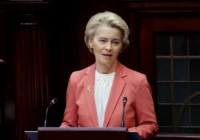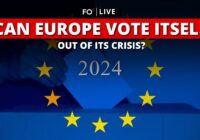In the golden age before the plague known as social media unfurled across the expanse of the Earth, much of traditional media maintained a quaint, now clearly abandoned habit. Directors of major newspapers and media outlets along with their editors-in-chief sought to hire journalists capable of unearthing meaningful stories and reporting news that was of interest to the public. All that has changed. Before doing anything else, today’s journalists must learn to focus on the agenda of their media’s owners.
News has always been a business. Back in that golden age, it was a risky business. The kind of truth the public took an interest in could potentially diverge from the particular financial and ideological interests of the owners. In recent decades, media owners have developed several techniques to limit that risk.
Expectations about what the public expects to find in the news have changed. In times past, the news cycle was punctuated by what we can call “moments of crisis.” These were typically dramatic developments in various kinds of political, financial or cultural power struggles. They might appear as showdowns, political shakeups, or even scandals. Crises generally highlighted specific moments of a conflict or sudden revelations.
I’m tempted to call some of those events “aristocratic crises.” In the US there was Watergate that brought down a president, the Church committee’s challenge to the CIA, leading to new laws restricting its actions, or President Bill Clinton’s Monica Lewinsky scandal that led to impeachment. Through those events, powerful people or institutions saw their authority challenged and their status modified.
But there was another category I like to call “popular crises.” They resonate throughout society and affect the entire body politic. Unlike an aristocratic crisis that may lead to changes for the personnel of the ruling class, a popular crisis transforms the way society interprets the dominant narratives. One salient example took place around 1967. That was when the US public’s perception of the “meaning” as well as morality of the Vietnam War irrevocably shifted. It created political chaos for an incumbent president, spawned a massive protest movement as well as a backlash and changed the perception of the role of the US military, including transforming it into a professional army when President Nixon abolished the draft.
Because the owners of the corporate media have focused on reducing, if not eliminating risk by constricting and restraining the amount of unbridled truth-seeking reporting they permit, it is far rarer to see popular crises of the kind that dramatically challenged the US government’s policy in Vietnam or the French government’s control of higher education in 1968. It’s not that the truth can no longer emerge. If it is in any way disruptive, it simply won’t be mentioned in the legacy media. Instead, social media has amply filled in the gaps concerning truth-telling. But because social media is structured in the form of ideological silos, it can never achieve the scope required to change the general perception of a crisis.
This evolution in the culture of journalism has had a curiously transformative effect on the nature of the concept of crisis itself. UnHerd columnist Thomas Fazi highlights this phenomenon in an article dedicated to Europe’s incapacity to manage its culture of democracy. In his article, “Von der Leyen’s authoritarian plot: National democracies will be subordinate to her Commission,” Fazi describes an evolution, based on one woman’s ambition, towards a curious form of dictatorship that has the potential to destabilize Europe.
“Over the past 15 years,” Fazi writes, “the Commission has exploited Europe’s ‘permacrisis’ to radically, yet surreptitiously, increase its influence over areas of competence that were previously deemed to be the preserve of national governments — from financial budgets and health policy to foreign affairs and defence.”
Today’s Weekly Devil’s Dictionary definition:
Permacrisis:
A state of extreme and growing tension and aggravated contradiction maintained indefinitely by those in power as the means of avoiding any initiative aiming at the kind of resolution that might call into question their hold on power.
Contextual note
Two years ago, Collins Dictionary elected “permacrisis” its “word of the year.” The publisher’s head of learning explained that the choice was made because of “how truly awful 2022 has been for so many people.” The neologism first appeared officially a year earlier, when Europeans used it to describe the current era or a “new normal” characterized by “volatility, uncertainty, and a prolonged sense of emergency.”
Though some explain it as a consequence of the long drawn-out trauma of the Covid-19 pandemic, I see permacrisis as a cousin of another somewhat older neologism, “forever war,” a concept many commentators have identified as a prominent feature of the 21st century geopolitical landscape. The practice of forever war began in earnest when US President George W. Bush launched the infinitely expandable idea of his “global war on terror” and began applying it to multiple countries. President Joe Biden carried on the tradition when he solemnly promised that NATO’s war against Russia in Ukraine would last “as long as it takes” and subsequently agreed to offer “ironclad” support to Israeli Prime Minister Benjamin Netanyahu’s war of extermination intended to last until the coming of the Messiah.
Europe is already three years into its latest forever war for which Ursula von der Leyen has demonstrated her enthusiasm. She has also thrown her institutional weight behind another war whose initiator, Netanyahu, clearly wishes to endure and become his own forever war.
Historical note
When author Naomi Klein formulated the theory called “the shock doctrine,” she described an approach to international relations that aimed at implementing Washington’s neoliberal economic agenda across the globe. It featured a strategy of “disaster capitalism.” By exploiting or even provoking crises in different countries, neo-liberal economic doctors could step in to provide cures for the disease.
Her theory made sense in the era predating social media, when a crisis was expected to last for only a limited amount of time. Each of the crises Klein describes was expected to lead to a predictable solution: typically, one that would play out following rules established by Milton Friedman’s Chicago School of Economics and correlate with the policies of the International Monetary Fund (IMF).
It was a veritable system. Everyone agreed that there existed a universal cure, especially for complaints that a local leader sought to address with a local cure. Chilean Prime Minister Salvador Allende, for example, in 1973 set out on a path of economic reform that included the nationalization of industries including banks, agrarian reform, state control of the economy and health and education reforms. The US State Department considered those very cures to be the symptoms of a disease that required a universal cure.
Like a Hollywood studio that understands the tried-and-true value of remakes, the CIA invoked and executed the same scenario that had successfully played out 20 years earlier in Iran, when Britain and the US ganged up to oust a democratically elected Iranian Prime Minister Mohammed Mossadegh. Allende himself did not survive the coup. He may have preferred suicide to the type of cure his successor, the dictator Augusto Pinochet, was likely to administer.
After the collapse of the Soviet Union, the same pattern evolved into a sophisticated template called “color revolutions.” That trend continued and culminated in Ukraine’s Maidan Revolution in 2014. That was the occasion in which Victoria Nuland, a key operator in US President Barack Obama’s State Department, appeared to single-handedly engineer the intended outcome when she put her man, “Yats” (Arseniy Yatseniuk), in the catbird seat after chasing Ukrainian President Viktor Yanukovych from power.
It was shortly thereafter that the concept of the sudden dramatic crisis began to give way to the more efficient concept of permacrisis. In his article on the transformation of European politics, Fazi describes the ongoing coup engineered by Ursula von der Leyen, who today is entering her second term as president of the European Commission. Her plan consists of “placing loyalists in strategic roles, marginalizing her critics, and establishing a complicated web of dependencies and overlapping duties that prevent any individual from gaining excessive influence.” Perhaps more efficiently than Benito Mussolini’s March on Rome in 1922 or Adolf Hitler’s success when he merged the positions of Chancellor and President following President Paul von Hindenburg’s death in 1934, Madame Ursula is exploiting a prolonged state of crisis to exercise absolute power.
But unless she thinks NATO is under her command, she will be a dictator without an army, reminding us of Joseph Stalin’s famous remark: “How many divisions has the Pope?” And though, as I write, one of the pearls of German industry, Volkswagen, has fallen into a deep crisis manifestly linked to policies Washington imposed and Von der Leyen enthusiastically embraced — policies that have crippled Germany’s economy — she must certainly be gloating about her achievement, as she prepares, with increased authority, to reign over 27 countries for another five years.
*[In the age of Oscar Wilde and Mark Twain, another American wit, the journalist Ambrose Bierce produced a series of satirical definitions of commonly used terms, throwing light on their hidden meanings in real discourse. Bierce eventually collected and published them as a book, The Devil’s Dictionary, in 1911. We have shamelessly appropriated his title in the interest of continuing his wholesome pedagogical effort to enlighten generations of readers of the news. Read more of Fair Observer Devil’s Dictionary.]
[Lee Thompson-Kolar edited this piece.]
The views expressed in this article are the author’s own and do not necessarily reflect Fair Observer’s editorial policy.
Support Fair Observer
We rely on your support for our independence, diversity and quality.
For more than 10 years, Fair Observer has been free, fair and independent. No billionaire owns us, no advertisers control us. We are a reader-supported nonprofit. Unlike many other publications, we keep our content free for readers regardless of where they live or whether they can afford to pay. We have no paywalls and no ads.
In the post-truth era of fake news, echo chambers and filter bubbles, we publish a plurality of perspectives from around the world. Anyone can publish with us, but everyone goes through a rigorous editorial process. So, you get fact-checked, well-reasoned content instead of noise.
We publish 2,500+ voices from 90+ countries. We also conduct education and training programs
on subjects ranging from digital media and journalism to writing and critical thinking. This
doesn’t come cheap. Servers, editors, trainers and web developers cost
money.
Please consider supporting us on a regular basis as a recurring donor or a
sustaining member.
Will you support FO’s journalism?
We rely on your support for our independence, diversity and quality.










Comment